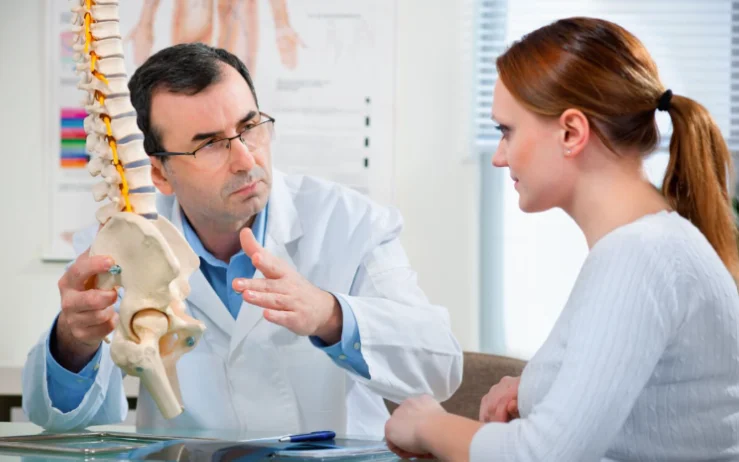A herniated disc occurs when the soft inner material of a spinal disc pushes through its outer layer, potentially compressing nearby nerves. This condition can cause pain, numbness, or weakness in the back, neck, or limbs. Herniated discs are most common in the lumbar and cervical regions and can affect mobility and daily activities. Early recognition and treatment are important to prevent worsening symptoms.
Common Symptoms and Diagnosis of Herniated Disc
Herniated discs present with a variety of symptoms depending on the affected spinal region. Common signs include:
- Localized back or neck pain
- Numbness or tingling in arms or legs
- Muscle weakness in affected areas
- Pain radiating to the shoulders, arms, or legs
Diagnosis involves physical examination, neurological tests, and imaging techniques like MRI or CT scans. Accurate identification of the affected disc and nerve involvement is critical for determining the most effective treatment plan, whether non-surgical or surgical.
Risk Factors and Causes of Disc Herniation
Several factors contribute to herniated discs, including:
- Age-related degeneration of spinal discs
- Repetitive lifting or heavy physical activity
- Poor posture and sedentary lifestyle
- Traumatic injuries or accidents
Understanding these risk factors helps in prevention and management. Patients can often reduce the likelihood of herniation through proper ergonomics, strengthening exercises, and avoiding high-risk activities.
Non-Surgical Treatment Options
Non-surgical management is often the first approach for herniated discs. Treatments include:
- Rest and activity modification
- Anti-inflammatory or pain-relief medications
- Epidural steroid injections to reduce inflammation
- Hot and cold therapy to alleviate discomfort
These options aim to reduce pain, improve mobility, and allow the body to heal naturally.
Physical Therapy and Exercise-Based Interventions
Physical therapy plays a vital role in managing herniated discs. Interventions may include:
- Targeted exercises to strengthen core and back muscles
- Stretching routines to enhance flexibility
- Postural training to reduce spinal strain
- Manual therapy techniques for pain relief
Consistent therapy can improve spinal stability, reduce nerve compression, and enhance long-term function. Personalized exercise programs help patients recover safely while minimizing the risk of re-injury.
Medications and Pain Management Strategies
Medications for herniated disc management are primarily aimed at relieving pain and reducing inflammation. Common strategies include:
- Nonsteroidal anti-inflammatory drugs (NSAIDs)
- Muscle relaxants to ease tension
- Oral corticosteroids for severe inflammation
- Pain-relief medications for acute discomfort
Minimally Invasive Procedures for Herniated Disc
Minimally invasive procedures offer relief for patients who do not respond to non-surgical treatments. Techniques include:
- Microdiscectomy to remove disc fragments
- Percutaneous endoscopic discectomy for targeted disc removal
- Laser-assisted disc decompression to reduce pressure on nerves
These procedures typically involve smaller incisions, reduced tissue trauma, and faster recovery compared to traditional surgery, making them suitable for selected patients with localized disc herniation.
Recovery and Rehabilitation After Herniated Disc Treatment
Recovery depends on the severity of the herniation and the chosen treatment. Key aspects include:
- Gradual reintroduction of physical activity
- Guided physiotherapy to strengthen supporting muscles
- Posture and ergonomics education to prevent recurrence
- Regular follow-ups to monitor healing
Rehabilitation is essential for restoring mobility, reducing pain, and ensuring sustainable results after both non-surgical and surgical interventions.
Ahmedabad is recognized for advanced spine care facilities, experienced orthopedic surgeons, and comprehensive rehabilitation programs. The city combines hospitals with specialized teams skilled in both non-surgical and surgical solutions for spine disorders. Patients seeking expert guidance can opt for Herniated Discs in Ahmedabad.


